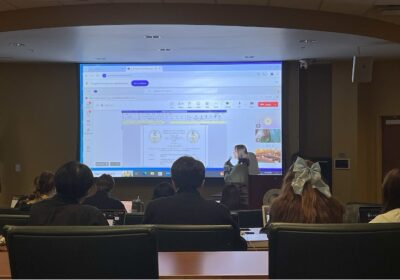USF has previously divested from companies. How are the Hunger Strikers’ demands different?

Pressure is on for USF to stop investing in companies that the Hunger Strike coalition claims “support genocide,” yet the university told the group that divesture is not possible.
However, an anonymous source told the strikers on March 19 that USF had divested from companies in the ‘80s.
The coalition is demanding USF cut ties with Hewlett Packard (HP), Boeing, Lockheed Martin, Northrop Grumman and Caterpillar – all companies that the group says directly send financial and material aid to Israel.
Althea Johnson, a USF spokesperson, said it was shared during a March 18 Board of Trustees (BOT) meeting that current state law does not permit state universities to make decisions about vendors, such as investment fund management services, based on social, political or ideological interests.
Johnson mentioned Florida Statute 1010.04 and HB3 as references, both passed in 2023.
The Oracle reached out to Johnson for specific clarification on why USF divested from companies in the past but can’t do so again.
“We don’t have information about state and federal laws from the 1980’s immediately available, but in 2024 we are guided by current state and federal laws,” Johnson told The Oracle.
Related: USF pro-Palestine hunger strikers removed from BOT meeting
Let’s go back to the ‘80s to understand the parallels between the different divestment scenarios at USF.
1980s South African divestments
The first time the USF Foundation was pressured to divest from companies operating in South Africa was in July 1985, when USF’s Student Senate passed a resolution demanding the divestments.
Joseph Busta, then-Vice President of the USF Foundation, didn’t initially believe that divestment was the best moral and economic move for USF, so the resolution was denied.
An advisory committee was established by John Lott Brown, then-USF President, in October 1985 to formulate USF policies regarding South African apartheid, or a system of racial segregation prevalent in the country.
The Student Coalition Against Apartheid and Racism (SCAAR) was formed in February 1986 to protest against South Africa’s system of apartheid with the ultimate purpose of pressuring USF to divest.
USF students who pushed for divestment organized several protests throughout the years. In November 1986, some students added red dye to the fountains at the Administration Building, saying it represented the blood of South Africa.
In October 1987, due to faculty and student backlash against investment in South Africa, the USF Foundation began with “selective divestment” of 18 out of the 24 companies doing business in the country.
The new investments had to be of equal statistical risk to the previous companies, present no current holdings and no ties to South Africa, which is why the Foundation took two years to begin with divestments.
Information in this section was provided by the USF Chronology with assisted research from Andy Huse, USF librarian and author of the chronology.
Students for Justice in Palestine (SJP) 2014 petition
Students’ demands for divestment from companies complicit in human rights violations in Palestine began with a petition 10 years ago, according to an Oracle article.
In addition to divestment, the petition asked for the formation of a committee to issue public reports to educate the community on how the endowment is invested. This is also one of the hunger strikers’ current demands.
Even though the petition calling on USF to divest gathered 10,000 signatures in 2014, the Foundation denied the group’s requests.
“The USF Foundation investment policy, process and investments will continue to be guided by its mission, fiduciary responsibilities and state or federal law or regulation,” the Foundation’s statement at the time read. “The USF Foundation will not divest investments or alter the investment policy or process based on requests from individuals or groups.”
What now?
Mari Marks, the policy manager for the Council on American-Islamic Relations (CAIR) in Florida, said the statute cited during the BOT meeting does not mean organizations cannot decline to purchase — it means they can’t pick favorites when purchasing.
“The USF students are asking that their tuition dollars not be spent on investments, vendor contracts and government bonds, where international human rights laws are being violated,” Marks wrote. “I have no doubt in my mind that if USF was invested in Palestinian companies, divestment would have happened Oct. 8, with full support from [Gov. Ron DeSantis].”
Alina Atiq, a member of the Hunger Strike coalition, said the claims that the investment process could not be politicized didn’t make sense to her. She said USF should not have been funding those companies in the first place.
“It is inherently political for you to be investing in corporations that give weapons to a regime like Israel,” Atiq said. “Apolitical would actually be divesting from the corporations involved in genocide.”
An Instagram post on the coalition’s page explains how every company the group is demanding USF to divest from is “supplying arms to Israel.”
Four of the companies the coalition mentioned in the Instagram post are on a list of companies profiting from Israel’s 2023-2024 attacks on Gaza. Hewlett Packard (HP) is not on the list.
Atiq said she didn’t fully understand the laws USF referred to because no one ever scheduled a meeting with the coalition to discuss the topic further. She said she tried reaching out to the university lawyer, but they haven’t responded.
Despite the coalition’s efforts in sharing their demands on social media platforms, holding hunger strikes and trying to schedule a meeting with USF President Rhea Law, Atiq said the university is not responding to the group.
Marks said the USF administration ignored two urgent requests to meet regarding her concerns for the health of the USF students.
When asked for clarification, Johnson said the university did respond to Marks but didn’t answer when and what was said in the response. She didn’t address if USF responded to Atiq.
Atiq said coalitions from McGill University and Brown University are also hunger striking. She said four other universities have been in touch with USF’s coalition.
Related: USF students to go on hunger strike for Palestine: ‘Putting our lives on the line’
The coalition’s next step in pushing for divestment will be to present a new resolution to the Student Government Senate on Tuesday, Atiq said.
Even though it took USF around two years to divest in the ‘80s, Atiq said efforts such as the hunger strike will continue until the university listens to the group’s demands. She said she feels confident that the pressure on the administration will grow until there is no other choice but to divest.
“It’s only going to get worse for USF as more people join the fight and find better ways to force the administration to concede to our demands,” Atiq said. “It’s not like we’re silently starving ourselves — we are utilizing different avenues until we find the best way to succeed.”
Telling USF’s story since 1966. Support our future






